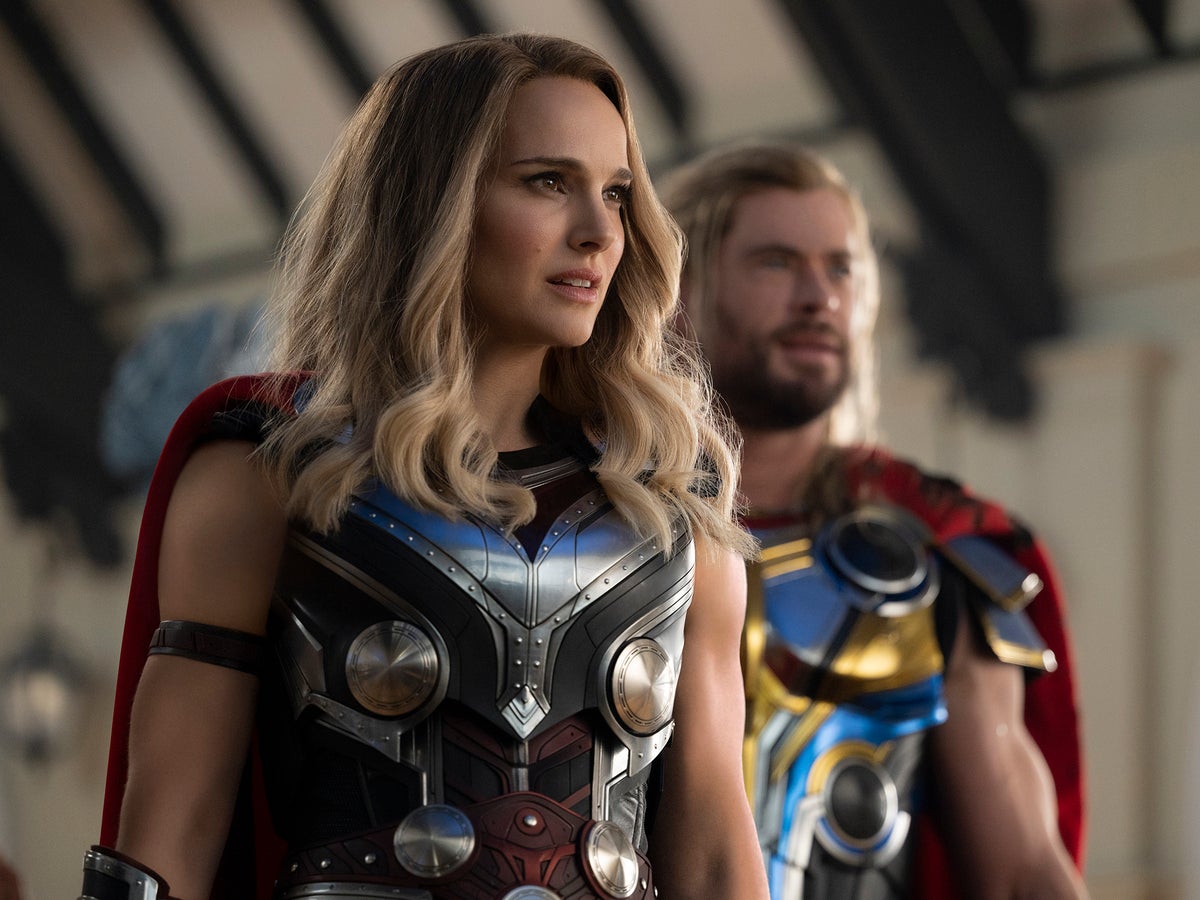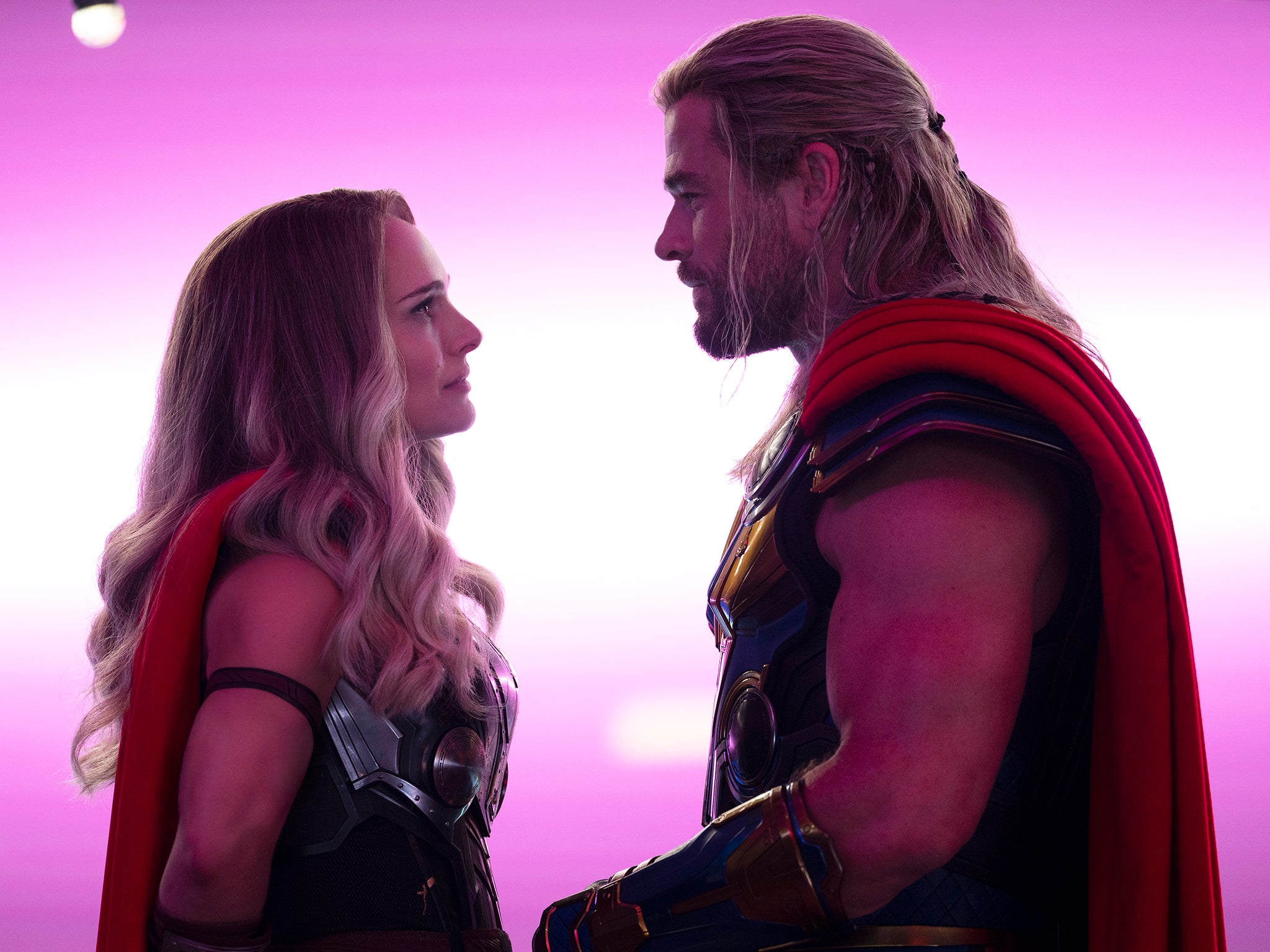
Dir: Taika Waititi. Starring: Chris Hemsworth, Christian Bale, Tessa Thompson, Jaimie Alexander, Taika Waititi, Russell Crowe, Natalie Portman. 12A, 119 minutes.
I can’t remember the last time the A-list stars of a Marvel film have all seemed genuinely happy to be there. But in Thor: Love and Thunder, Natalie Portman, Christian Bale, and Russell Crowe beam like they’re kids dropped headfirst into a vat of Tango Ice Blast. Portman, whose Jane Foster here wields the power of Mighty Thor, flexes her biceps and lands dorky joke after dorky joke – two things so rarely granted to the actresses Hollywood demands are perpetually dainty and polite. Bale, as villain Gorr the God Butcher, gets to crawl around on all fours wailing and hissing, with amber-hued snake pupils and a profile that’s distinctly Skeletor-esque. Crowe, as Zeus, has a miniskirt and the wildest Greek accent you’ve ever heard in your life.
These three are in actor heaven, gambolling around a soundstage as if it were their own personal playground. That probably has a lot to do with who’s behind the camera here – one Taika Waititi, who, since 2017’s Thor: Ragnarok, has become the shining exemplar of how to navigate the mainstream without losing your soul in the process. He’s one of the only people who could ever convince Bale to return to the superhero genre post-Batman, and Portman to forgive the franchise that burned her so badly with her lacklustre roles in Thor (2011) and Thor: The Dark World (2013).
Waititi may be a leading candidate for the title of “Hollywood’s busiest man”, but it’s impressive how little his output’s been watered down by its near-terrifying volume. A Waititi production is still distinctly a Waititi production – a patchwork quilt of primary colours, as outsider figures and disappointing fathers joke their way through trauma. Love and Thunder, a sequel born entirely out of the effusive reception for Ragnarok, is arguably the closest he’s ever come to autopilot – and yet it’s still such a delight, motor-powered by goofy self-awareness and childlike imagination. It’s also the rare bit of Marvel output that actually remembers the main audience for these films should be kids and not adults with YouTube channels.
It’s certainly not as thematically tight as Ragnarok, which snuck in a fairly sharp critique of colonialist narratives. And both of Waititi’s Marvel films struggle with the same issue – that he’s been lumped with so much franchise baggage that it takes about 20 minutes to clean up the mess before the fun can actually begin. The Guardians of the Galaxy appear here, but in a contractually obligated kind of way. And the film has absolutely no idea what to do with Thor’s clumsily handled weight gain subplot in Avengers: Endgame.
But once Waititi, and his co-writer Jennifer Kaytin Robinson, push all of that out of the way, you can almost feel the stick-shift change in Love and Thunder. Its plot sees Thor (Chris Hemsworth) venture out of his self-imposed, emotional cocoon in order to rescue the children of New Asgard. They’ve been kidnapped by Gorr, a grieving father who’s dead set on vengeance against the gods who rewarded his faith with contempt. A standard mission, maybe, that’s complicated by the sudden appearance of Thor’s ex-girlfriend Jane Foster, now wielding his ex-hammer, Mjolnir.
How did she get her hands on a weapon like that? I won’t spoil the answer (though comic fans might already have an inkling), but Portman’s finally been handed an MCU storyline that’s worthy of her talent – a simple but potent take on waking yourself up out of a state of self-denial. Love and Thunder has less of the usual Waititi stuff we’ve grown to expect, namely themes of insecure masculinity and marginalisation broached with a lightness of touch. But it radiates with that titular love. It’s a true family affair, with the real-life children of Waititi, Hemsworth, and Portman all making cameo appearances. Meanwhile, Tessa Thompson’s Valkyrie gets an extended role as the King of New Asgard, her deadpan nonchalance covering for the lingering grief of losing the woman she loved in battle (her bisexuality was only hinted at in Ragnarok, but it’s confirmed here). The way the actor so coolly delivers the words “ding dong”, in a cut-glass British accent, made me immediately wonder when – oh, when – we’ll finally get a Valkyrie solo film.

Waititi continues to paint in bold and colourful strokes. Zeus’s home, a planet inhabited by a truly global population of mythical figures, is so busy with detail that it might take a hundred watches just to absorb everything that’s been placed on screen. And there’s a real touch of adventure to some of the technology deployed here – the use of massive LED backdrops (first popularised on the set of Disney+’s The Mandalorian) in place of traditional green screen gives everything a little more object permanence, while a black-and-white sequence shot with shattered light effects is one of the most inventive and straightforwardly good-looking Marvel action scenes we’ve seen in an aeon.
Of course, Ragnarok’s distinctive humour is carried over, and there’s a blissfully dumb running joke about a pair of giant, heavy metal-screaming goats. But, really, it’s the heart that matters here. Love and Thunder’s characters are all running towards the same conclusion: that, no matter how long or short our time on Earth (or any planet) may be, we’re all inevitably living for the benefit of others. We love. Then we love again. It’s nice for Marvel, always caught up in its own chaos, to remind us of something so simple.
‘Thor: Love and Thunder’ is in UK cinemas from Thursday 7 July







